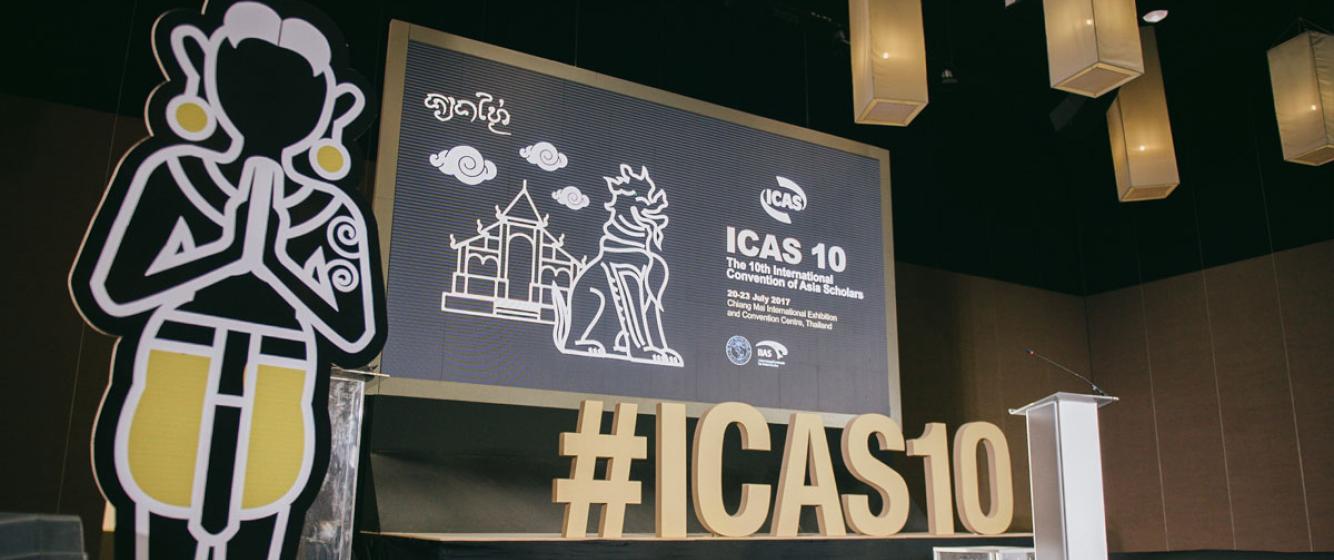
ICAS 10 - Chiang Mai
ICAS 10, Chiang Mai
20–23 July 2017
After a decade it was high time to return to Southeast Asia. The RCSD at Chiang Mai University in Thailand requested the opportunity to organise the 10th edition of ICAS in connection with 50 years of the Association of Southeast Asian Nations (ASEAN), and to hold it back to back with their Thai Studies conference. According to the organiser of both conferences, Chayan Vaddhanaphuti: “The emergence of the ASEAN community in Asia is a hope for economic, political and socio-cultural connectivity as well as a challenge for policymakers and the grassroots. ASEAN in Asia is, thus, one of the central themes of this conference”. As a result, Surit Pitsuwan, former Secretary-General of ASEAN, was invited to speak at the opening ceremony, where he made a passionate plea for democratic values and academic freedom.
His speech closely connected with the ICAS Keynote Roundtable ‘Upholding Democratic values in Southeast Asia: Intellectual Freedom and Public Engagement’. Two Southeast Asian historians and a social rights activist from Thailand addressed the situation of democratic deficit prevailing in most Southeast Asian countries by focusing on the social and political roles they play as actors and witnesses of ASEAN’s recent history. More than three hundred participants joined in the lively discussions chaired by IIAS Director Philippe Peycam. This format proved fruitful and is also planned for future editions of ICAS because it embraces a multitude of voices and views and is apt for a meeting such as ICAS.
This multitude of voices should also be present in the ICAS Book Prize (IBP). ICAS and the IBP can be regarded as one of the ways to facilitate the confluence of localised ‘connected knowledges’ and also the decentring of the landscape of knowledge about Asia. From the start, the IBP has had a broad interdisciplinary basis - Social Sciences and Humanities - instead of the traditional geographic or disciplinary compartmentalisations. The diversification of the IBP’s language basis, in collaboration with partners and sponsors from other language areas than English, was realised at ICAS 10: the ICAS Book Prize was extended to include Chinese, German, French and Korean language editions.
The Film Screenings organised by the Center of Southeast Asian Studies (CSEAS) of Kyoto University were a reflection of Southeast Asia’s rich ethnic and cultural landscape, and an outcome of CSEAS’ Visual Documentary Project, which aims at examining everyday life in Southeast Asia through documentary filmmaking and stimulating the dialogue with ASEAN countries. No less than thirty documentaries varying in length from 15 to 70 minutes were presented with titles ranging from Ageing in Bangkok to Burmese in Thailand and Lives Under The Red Lights to Silence of the Summer.
The emergence of the ASEAN community in Asia is a hope for economic, political and socio-cultural connectivity as well as a challenge for policymakers and the grassroots – Chayan Vaddhanaphuti, organiser ICAS 10
ICAS 10 in Chiang Mai was memorable in so many ways. The venue was massively impressive, the RatiLanna Resort catered the most beautiful and delicious Lanna-style receptions and lunches, and Akkanut Wantanasombut together with Rhinosmith Design co. created the most stunning overall design of any ICAS yet! Not to mention the twenty thematic exhibitions in traditional wooden structures, showcasing a wide variety of local projects, including, for example, ‘Salween Local Research Display: bringing the Village to the Conference’. Local researchers from villages along the Salween River, which flows through Thailand, Myanmar, and China, have been conducting research into the social and environmental issues related to the river; they displayed the outcomes of their research to start conversations with academics, professionals, activists and others from all over the world. To finish it off a real market place with a wide variety of local quality produce stood at the entrance of the convention centre. Many participants took craft items home along with fond memories of an exceptional ICAS.